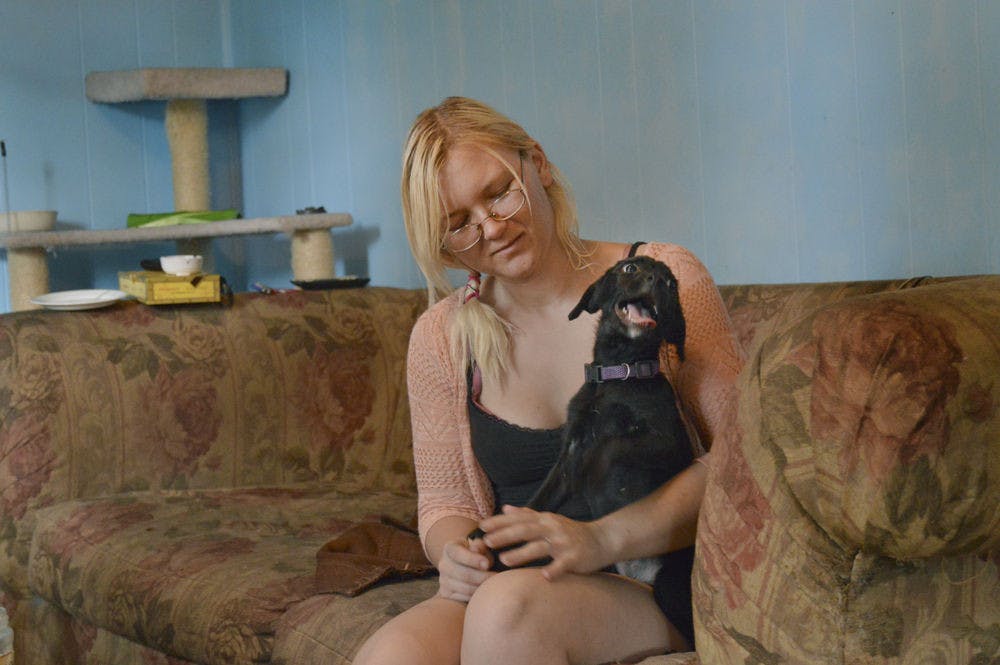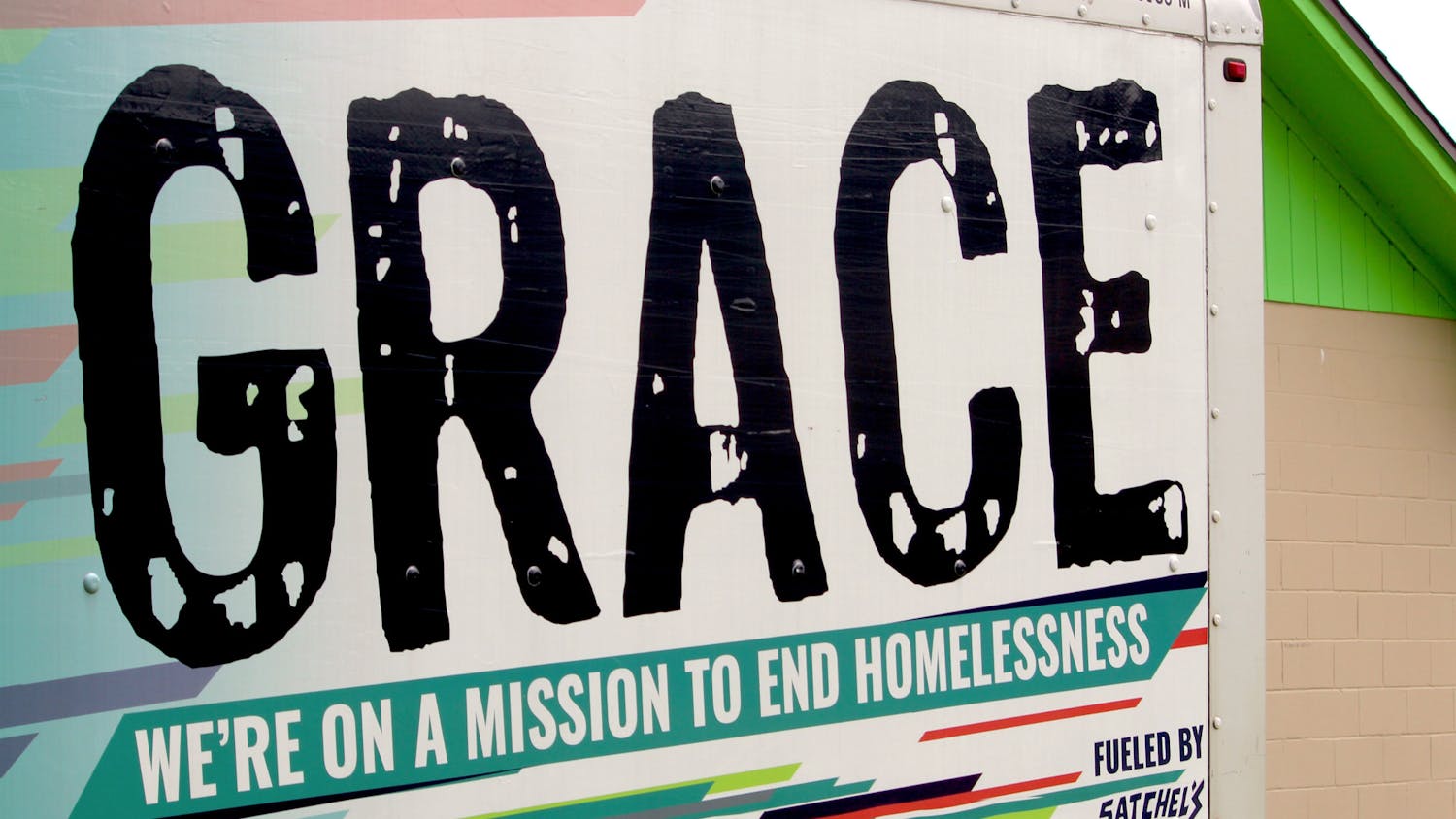Rebecca Pardini used to be homeless.
Now she works a part-time job at the super Wal-Mart on Waldo road, earning $9 an hour and working 40 hours a week.
It was the only place out of the dozen she applied to that would hire her when she had no address to put on her application.
“No one likes to hire a homeless person,” Pardini said. Her light blond hair sat neatly across her shoulder in a braid, her silver-framed glasses shielding her blue eyes.
Before she was homeless, she was adopted from Russia when she was 2 years old by her parents. She grew up in San Jose, California.
The now 22-year-old dreams of going to college and becoming a veterinarian.
“I just want to be able to go to school,” she said.
• • •
At the age of 18, two months after graduating from high school, Pardini ran away from home.
On her way, she fell into drugs and alcohol, traveling across state borders with friends and boyfriends she met along the way.
She found herself in the woods of Sweetwater Branch Tent Camp with a boy she traveled with from Oregon.
Two months after they arrived, he left, taking the last of her things.
She had nowhere to go. She ended up out in the woods in tents with fellow homeless peers.
After a few years of traveling, Pardini said she was tired of barely getting by on the a few dollars she made from panhandling.
“I’m done. I want to be happy,” she said, adding that she enjoys having a shower and a roof over her head.
That was two years ago. She now lives in a one-bedroom apartment, where she pays $620 rent that includes an extra $25 for each of her pets — two cats and a dog.
Because she’s considered a dependent under her parents’ taxes, she will have to wait until she is 25 to receive federal aid.
Pardini is not alone.
The number of homeless youths seeking higher education has been increasing because of the College Cost Reduction and Access Act, Cyekeia Lee, the director of Higher Education Initiatives of the National Association for the Education of Homeless Children and Youth, wrote in an email.
The act makes it easier for independent students to access higher education, she said.
The Free Application for Federal Student Aid (FAFSA) is the only indicator of just how many students attending college are homeless, and not many students report their homeless status, she said.
Tanja Philhower, the assistant dean of students at UF, said she’s seen at least one student a semester who faces the extreme circumstances of homelessness — living out of a car or a tent — while still attending school.
It’s more common to have students come to the office in risky housing situations, like when they’ve received eviction notices, she said.
“We try to figure out what their current financial situation is,” Philhower said, and go from there.
Oftentimes, if a student loses his or her job or falls on hard times, they are able to resubmit his or her FAFSA to receive federal money, she said.
Homeless students aren’t a demographic UF keeps track of, Philhower said. UF does their best in helping students with the resources available.
• • •
Before she began working at Wal-Mart, Pardini’s hair used to be every shade of the rainbow.
“It used to be blue,” her favorite color, she said and laughed. At one point, her hair was multi-colored; pink at the roots that blended into purple, light blue and then blue.
But because of her job, she had to dye it blonde, her natural hair color.
Not that she’s complaining. She doesn’t know why they hired her, but she didn’t question it.
She’s just glad she got the job.
She currently lives in an apartment off of Archer Road with her two cats, Patches and Loki, and dog, Knucklehead.
All three pets lived with her at the tent camp.
The people at Helping Hands Clinic helped motivate her to get her life on track, she said.
While she appreciates all the help and supplies from Helping Hands, she volunteers because she didn’t like getting free stuff.
“I like to be able to work for what I get,” she said.
Because of her job, she only volunteers there once a month. She used to show up every Monday and Thursday, the days the clinic operated.
There, she received personal hygiene products. She still receives items to offset her costs.
When she volunteers, she helps file paperwork, fill out forms, and usher the people who are there to take showers, receive medication and get clothes.
Brendan Shortley, manager and volunteer coordinator of Helping Hands Clinic, said he remembers when Pardini was just a client.
“She expressed a desire to help and give back,” he said.
He decided to bring her in as a volunteer to help her get on the right track.
“She’s smarter than people give her credit for,” Shortley said.
He was impressed by her energy and youthfulness, something rare in adults who come off the streets.
He remembers meeting her a few years ago when she had nothing.
Now, he’s seen her blossom, becoming her own person with her own place and a job.
Shortley said he encouraged Pardini to get back to school.
“We’re really happy” that she wants to go back to school, he said.
Many times, homeless adults are too busy trying to secure shelter, food and safety that they never get around to getting back into work or education, he said.
With the establishment of Grace Marketplace, a local outdoor shelter, stability is possible, Shortley said.
He said he expects to see a rise in adults taking the next step toward work or continuing their education.
• • •
In the meantime, Pardini is settling for just working and volunteering, riding the bus to each destination.
She admitted that she misses being out on the road, traveling with no destination in mind. There was a freedom to it, she said. But the risks were high.
“There’s never 100 percent safety down there,” she said, referring to being out in the woods, where people would drink and get careless.
Pardini said she’s not picky about what school she wants to go to, as long as she gets to.
Once she does, she wants to study to become a veterinarian. She had a puppy, Angel, who she was looking after for a friend who was in jail.
“I know that if I win the lottery, I want to get a farm and save all the animals,” she said before laughing. “But, I don’t know how well that’ll work out.”
[A version of this story ran on page 1 on 8/5/15]
Rebecca Pardini plays in her home with Angel, a puppy she's taking care of for a friend. The 22-year-old was homeless for three years.






